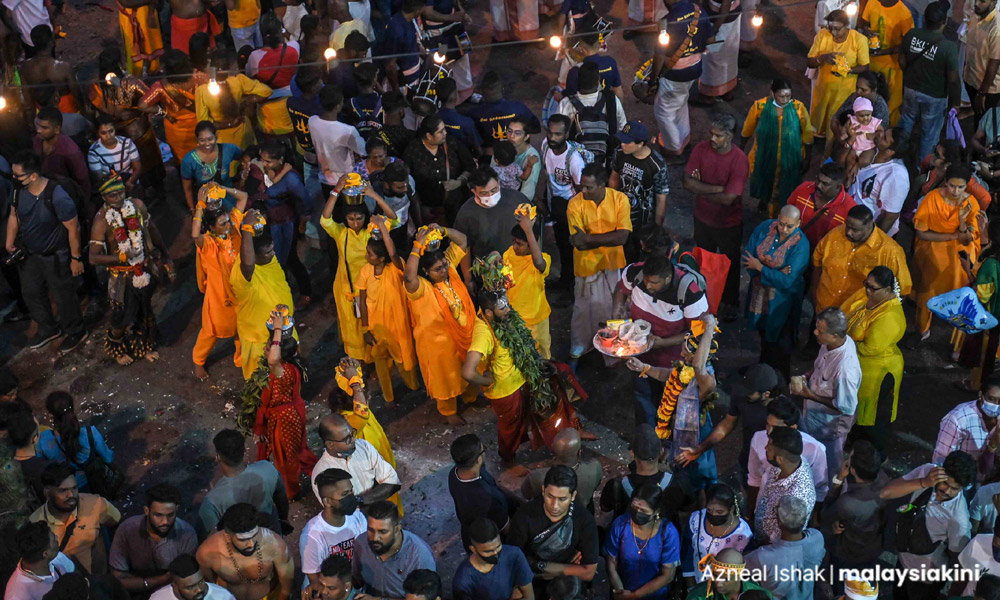
'Quit politicising religion' - politicians told
The country has recently witnessed politicians freely spouting racially charged statements in efforts to gain political brownie points.
One latest instance involved Kuala Langat MP Ahmad Yunus Hairi urging the government to avoid building non-Muslim houses of worship in the same vicinity as mosques.
This is to avoid "noises from loudspeakers disrupting the peace of the residents there", the PAS lawmaker said during a debate in Parliament recently.
A check on the ground by Malaysiakini revealed that the majority of people living in Brickfields, Kuala Lumpur and Batu Caves, Selangor - two places abound with places of worship of different races - have no problems with the arrangement.
Yusuff Ahmad, a retired businessperson who goes to the Madrasathul Gouthuyyah Surau in Brickfields for prayers daily, took Yunus to task for the remark and urged the latter to quit politicising religion.
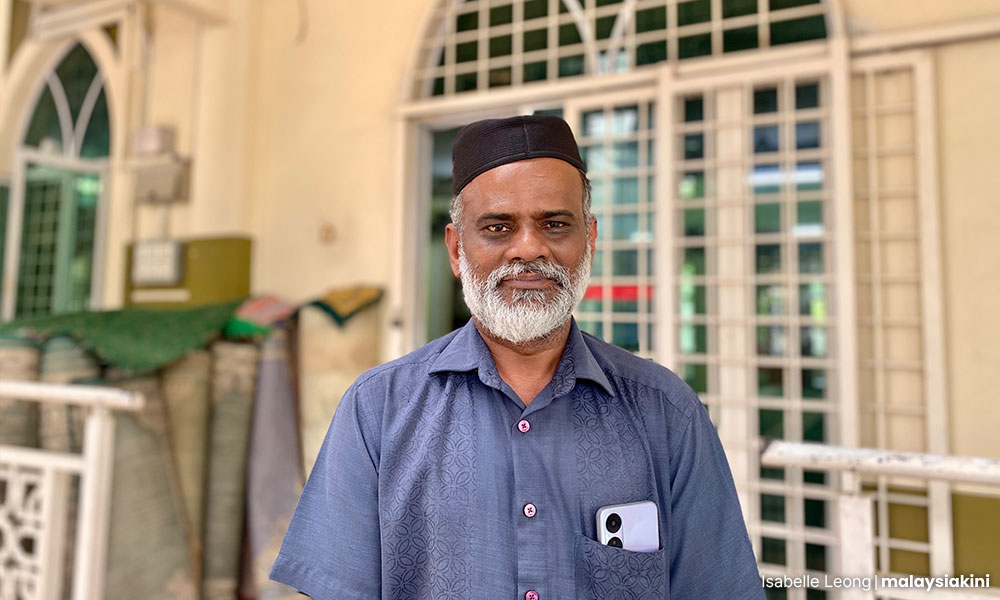
Retired businessperson Yusuff Ahmad
"These politicians want to win (in elections), right? So they come up with a new story. But you see, we (the public) are united.
"Whether you go to a mosque or a temple, when you see a place of worship, you will be at peace. We don't have any problems with each other," Yusuff told Malaysiakini.
In parting words, the 56-year-old told politicians to stop "making up stories to disrupt public unity".
An artist who only wished to be identified as Tan concurred with Yusuff, saying that the public should not pay heed to politicians who make such remarks.
"That is his (Yunus') opinion, not all Malaysians feel the same.
"Malaysia is a multicultural, multiracial country. So we should respect one another's culture and religion.
"He (Yunus) made such remarks only to garner votes. And when he gets the votes, he will forget about it," the 45-year-old Brickfields native added.
"These politicians want to win (in elections), right? So they come up with a new story. But you see, we (the public) are united.
"Whether you go to a mosque or a temple, when you see a place of worship, you will be at peace. We don't have any problems with each other," Yusuff told Malaysiakini.
In parting words, the 56-year-old told politicians to stop "making up stories to disrupt public unity".
An artist who only wished to be identified as Tan concurred with Yusuff, saying that the public should not pay heed to politicians who make such remarks.
"That is his (Yunus') opinion, not all Malaysians feel the same.
"Malaysia is a multicultural, multiracial country. So we should respect one another's culture and religion.
"He (Yunus) made such remarks only to garner votes. And when he gets the votes, he will forget about it," the 45-year-old Brickfields native added.
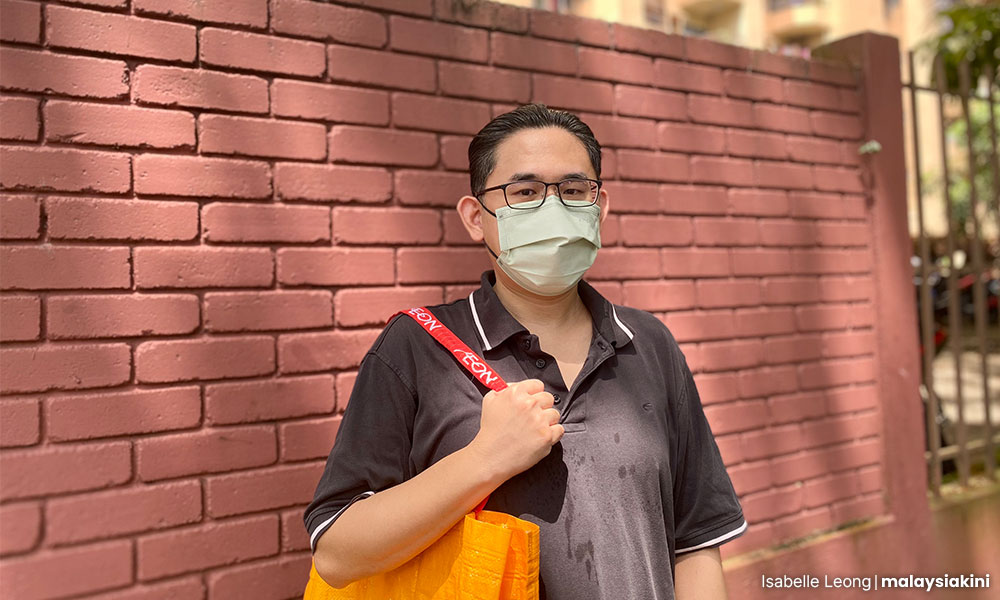
Artist Tan
Having lived in the area all his life, Tan said neither the call of azan nor the toll of the church's bells have bothered him.
"In fact, I kind of like them because I consider them as a morning call, like an alarm," he added.
'Country belongs to everyone'
A housewife known as Mageswari echoed Tan's sentiment, saying she had no issues with the Muslim call to prayer and neither do her friends in the Chinese and Indian communities.
"They are only worshipping their God. This country belongs to everyone, so we must respect one another's religions," added the 62-year-old.
Having lived in the area all his life, Tan said neither the call of azan nor the toll of the church's bells have bothered him.
"In fact, I kind of like them because I consider them as a morning call, like an alarm," he added.
'Country belongs to everyone'
A housewife known as Mageswari echoed Tan's sentiment, saying she had no issues with the Muslim call to prayer and neither do her friends in the Chinese and Indian communities.
"They are only worshipping their God. This country belongs to everyone, so we must respect one another's religions," added the 62-year-old.
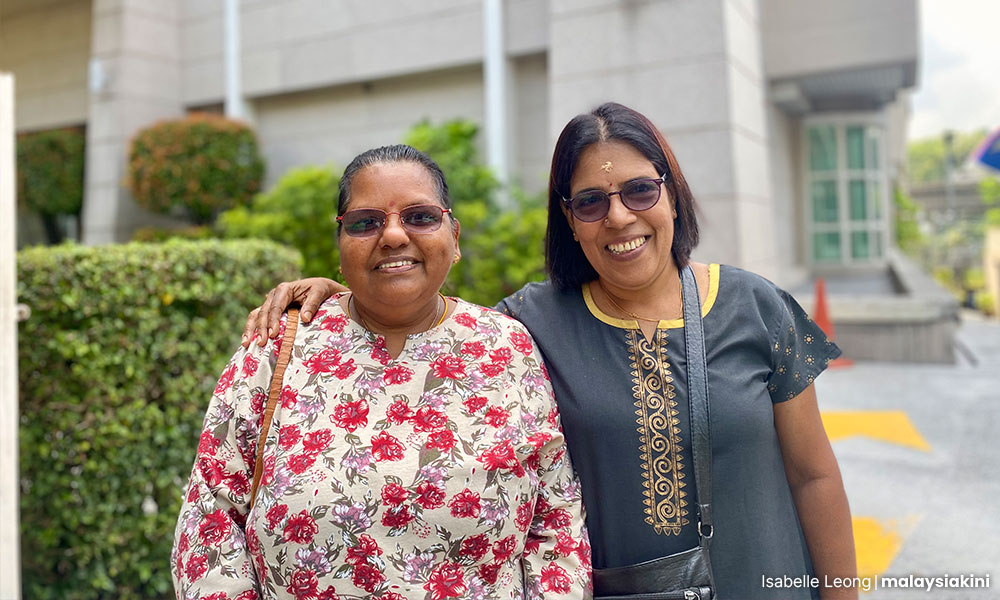
Housewife Mageswari (left)
Another resident, who only wanted to be known as Chong, said it's truly remarkable to have various religious places of worship in one locality.
"The surau here (in Brickfields) doesn’t bother me. Back in my hometown in Raub, Pahang there’s a mosque right in front of my house. It's no big deal," the retired government servant said.
Chong, 73, stressed that some politicians use topics on religion and Malays, which border on "dangerous territory", as ammunition for political expediency.
"We have to teach our children not to talk about these issues. We must not go beyond the 'red line'. That’s a fact.
"The politicians are taking advantage of it, we must not let them do so."
Politicians to blame
A retired teacher who only gave her name as Katkampikai did not mince her words - squarely blaming politicians for driving a wedge among the people.
Another resident, who only wanted to be known as Chong, said it's truly remarkable to have various religious places of worship in one locality.
"The surau here (in Brickfields) doesn’t bother me. Back in my hometown in Raub, Pahang there’s a mosque right in front of my house. It's no big deal," the retired government servant said.
Chong, 73, stressed that some politicians use topics on religion and Malays, which border on "dangerous territory", as ammunition for political expediency.
"We have to teach our children not to talk about these issues. We must not go beyond the 'red line'. That’s a fact.
"The politicians are taking advantage of it, we must not let them do so."
Politicians to blame
A retired teacher who only gave her name as Katkampikai did not mince her words - squarely blaming politicians for driving a wedge among the people.
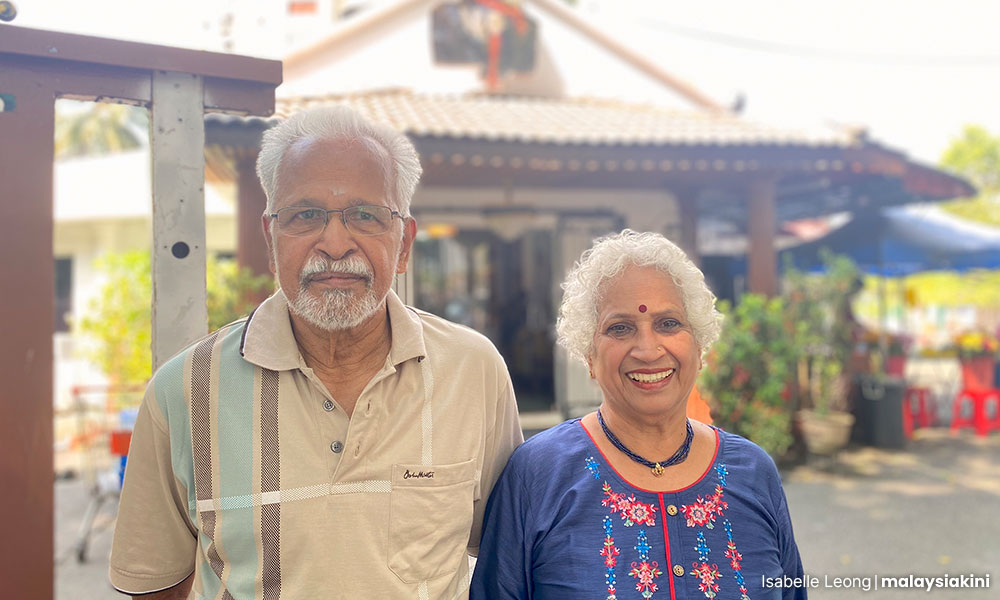
Retired teacher Katkampikai with her husband
She recollected joyful moments of nostalgia during her schooling days when her Malay friends would visit her during Deepavali and enjoy her cooking.
"Today, no Malay friends would come and eat at my house, even though I'm 100 percent vegetarian.
"The idea, the segregation, came through the politicians. Nobody to blame but the politicians," said the 76-year-old.
Similar remarks were voiced among those surveyed in Batu Caves where thousands of Hindus and tourists converge annually for Thaipusam at the Sri Subramaniar Swamy Temple.
The days ahead of the celebration also see traffic gridlocks and road closures in areas surrounding the world-renowned landmark.
She recollected joyful moments of nostalgia during her schooling days when her Malay friends would visit her during Deepavali and enjoy her cooking.
"Today, no Malay friends would come and eat at my house, even though I'm 100 percent vegetarian.
"The idea, the segregation, came through the politicians. Nobody to blame but the politicians," said the 76-year-old.
Similar remarks were voiced among those surveyed in Batu Caves where thousands of Hindus and tourists converge annually for Thaipusam at the Sri Subramaniar Swamy Temple.
The days ahead of the celebration also see traffic gridlocks and road closures in areas surrounding the world-renowned landmark.
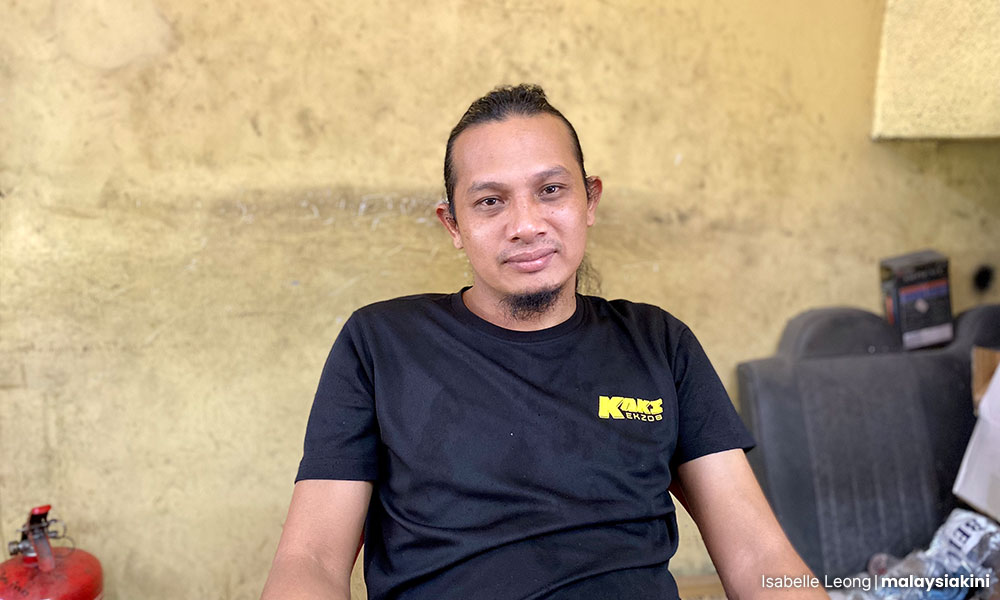
Mechanical shop owner Amizul
However, traders around the vicinity of the temple have no issues going through the above-mentioned restrictions every year.
"During the festival, all roads leading to Batu Caves would be closed and the traffic would be bad.
"We understand and that is why we are closed on that day every year," said a businessperson called Amizul, who owns a mechanical shop just a stone's throw away from the famous temple.
Technician Lim Eng Hock echoed Amizul's sentiments.
"It doesn't feel like my business is making a loss. It's normal for them to celebrate and we respect that,” he said.
However, traders around the vicinity of the temple have no issues going through the above-mentioned restrictions every year.
"During the festival, all roads leading to Batu Caves would be closed and the traffic would be bad.
"We understand and that is why we are closed on that day every year," said a businessperson called Amizul, who owns a mechanical shop just a stone's throw away from the famous temple.
Technician Lim Eng Hock echoed Amizul's sentiments.
"It doesn't feel like my business is making a loss. It's normal for them to celebrate and we respect that,” he said.
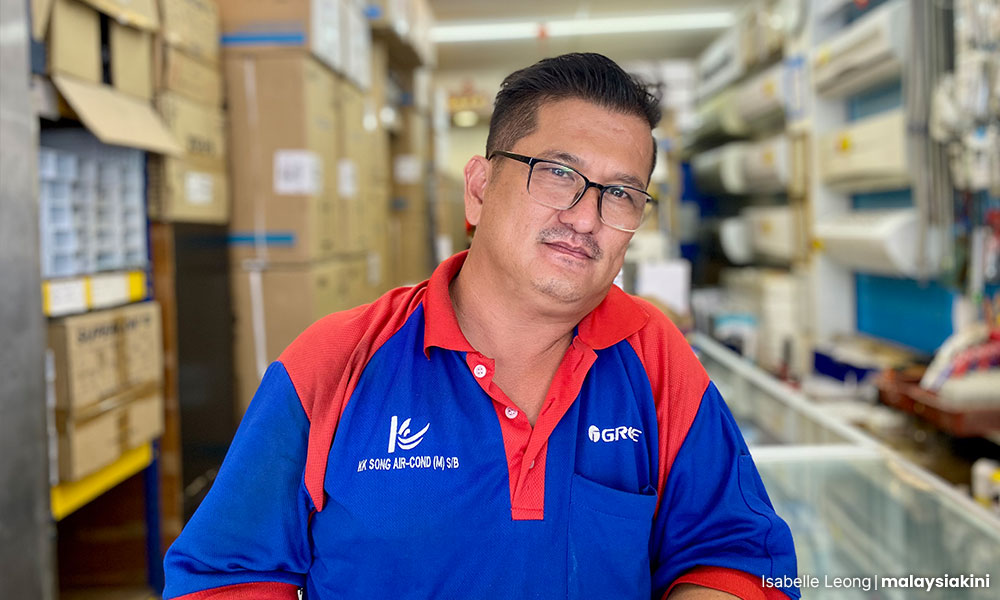
Technician Lim Eng Hock
Speaking about the "vibrant sights" of Thaipusam, 23-year-old Yunita Sari's eyes lit up as she formed a smile.
"People from different races would come together to see the chariot procession.
"Although some of my neighbours and relatives would go on a 'staycation' to avoid the noise, I would always stick around to watch the festival," the administration worker said.
Yunita bemoaned politicians who stoke racial tension, saying she's worried for future generations.
Speaking about the "vibrant sights" of Thaipusam, 23-year-old Yunita Sari's eyes lit up as she formed a smile.
"People from different races would come together to see the chariot procession.
"Although some of my neighbours and relatives would go on a 'staycation' to avoid the noise, I would always stick around to watch the festival," the administration worker said.
Yunita bemoaned politicians who stoke racial tension, saying she's worried for future generations.
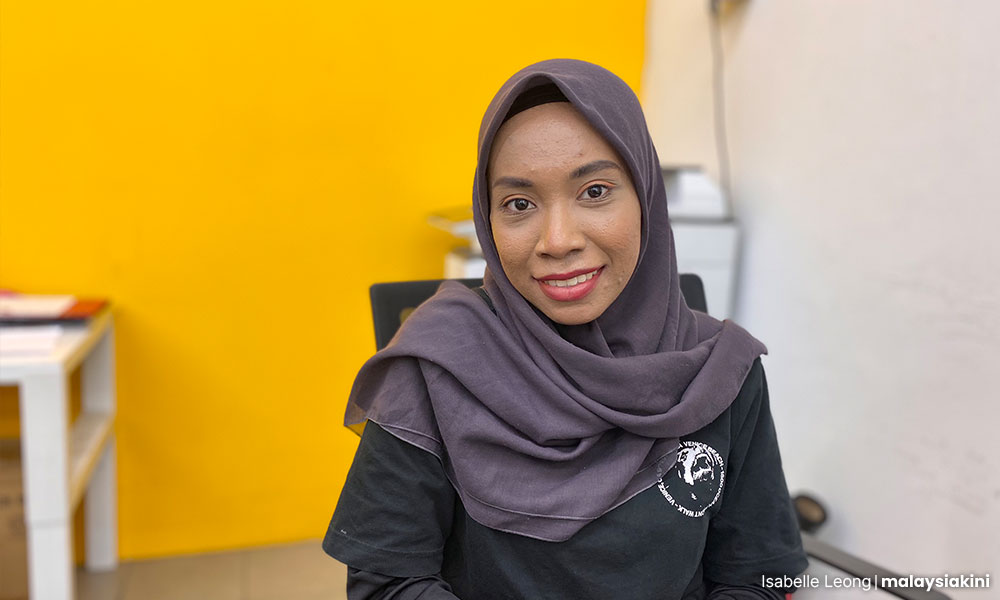
Administration worker Yunita Sari
"I know many Malays who live here, but we live harmoniously with other races. Why do they have to politicise everything?
"For example, if something is illegal for the Malays, it doesn't mean it's the same for the Chinese or Indian community.
"What will happen to our future generation? Will they end up despising their own religion?" she questioned.
"I know many Malays who live here, but we live harmoniously with other races. Why do they have to politicise everything?
"For example, if something is illegal for the Malays, it doesn't mean it's the same for the Chinese or Indian community.
"What will happen to our future generation? Will they end up despising their own religion?" she questioned.
"She recollected joyful moments of nostalgia during her schooling days when her Malay friends would visit her during Deepavali and enjoy her cooking.
ReplyDelete"Today, no Malay friends would come and eat at my house, even though I'm 100 percent vegetarian."
Comment: unfortunately, the so-called bond on the ground is not strong enough as exemplified by this anecdote.
It seems it is the malays who are the ones most affected by politicians politicising religion. Thus visits to non muslim homes no longer take place.